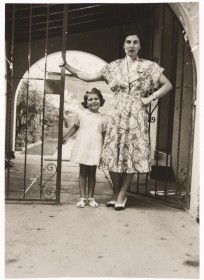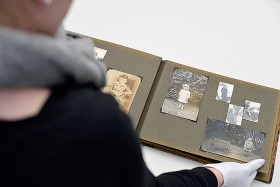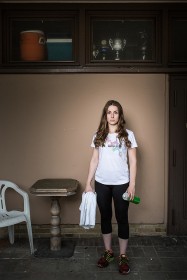A Look at the Radzewski Family Photo Collection
We all have family: father, mother, children, grandchildren, grandparents, aunts, uncles, or just relatives casually come across at family reunions or known from photos. “The uncle, living abroad, with the daughter and the grandchildren – don’t you remember him?” We’ve all heard that.

The donor, Vera de Jong with her mother, Meta Krotoschiner in front of their home in Santiago, Chile, in 1952, following immigration © Jewish Museum Berlin, gift of Vera de Jong, née Krotoschiner-Radzewski
What happens when there’s no one to keep telling these stories? Only a photo of these people remain, if you’re lucky, sometimes a postcard that says nothing. This isn’t only the case in our private lives. As museum workers, we confront this challenge on a daily basis, especially when inventorying collections of donors’ family photographs. Each photo poses the same questions: Where was this? Who were these people – friends or relatives? What’s the story behind the image?
Fortunately we have help. Along with the photographs, donors provide and entrust us with their memories. Vera de Jong, born Krotoschiner-Radzewski, is one such example. Last year she gave our museum some 200 family photos (further information about the Photographic Collection on our website). As an academic trainee, it was then my task to inventory this collection and research its history. I was immediately taken by these charming images and, while researching them, understood their historical value, helping us uncover more than a century of family history. → continue reading

At work, view over the shoulder – open photo album of Olga Irén Fröhlich © Jewish Museum Berlin, photo: Oliver Stratz
I’m looking at recorded instants of an eventful life. 511 moments. Captured by photography, meticulously organized according to subject matter over four photo albums. They come from the estate of Olga Irén Fröhlich, a German-Jewish singer and cabaret artist who worked from the 1930s into the 1960s.
Interesting and poignant biographical stories are often hidden behind the photographs that come into my hands every day. The history of these four photo albums and their one-time owner is a very particular one for me, however, because it’s at once unusual and moving. → continue reading
The 14th European Maccabi Games (EMG) are taking place in Berlin from 27 July until 5 August 2015. More than 2,000 Jewish athletes from 36 countries will compete in 19 sports from football to fencing to chess. To accompany the games Tamar Lewinsky and Theresia Ziehe are producing a series of portraits with interviews, introducing a new member of the German delegation from Berlin every day here on the blog. They conducted the interviews on the grounds of the TuS Maccabi in Berlin’s Grunewald where Stephan Pramme also shot the portraits.
Daliah Hoffmann (24), half-marathon

Daliah (24) Half Marathon © Jewish Museum Berlin, photo: Stephan Pramme
Daliah, why are you taking part in the European Maccabi Games?
I’m here because sports are an extremely important part of my life, and, of course, I want to experience this event in Berlin; it’s an opportunity not to be missed. However, I thought twice about it because I’ve already run a half-marathon this year, and that was enough. Yet it’s really nice to run together with family.
What’s required to participate in these Games?
First of all, you have to show you’re Jewish with your birth certificate and those of your family, as far as I can recall. If it were up to me, I’d also let people in who somehow feel connected to the religion. I think it’s unfortunate that some aren’t allowed to be part because they aren’t Jewish on paper, but feel Jewish or were raised Jewish, even if their mother isn’t.
What does Judaism mean to you personally? → continue reading


